unit 12 What did youdo last weekend Section B 2
完整wordUnit12Whatdidyoudolastweekend知识点总结推荐文档

Unit 12 What did you do last weekendUnit 12 What did you do last weeke nd?一.重点短语及句子(一)重点短语原形过去式camp by the lake camped by the lakeplay badm inton played badm intonwork as worked asstay up stayed upshout to shouted toshout at shouted atstudy for the En glish test studied for the En glish test go to the cin ema went to the cin emago boati ng went boat inggo to the beach went to the beachgo to a farm went to a farm go to the library went to the libraryfly a kite flew a kitehave dinner with friends had dinner with friendsrun away ran awaydo one's homework did one ' homeworkget a surprise got a surprisewake up woke upput up put up(二)重点句子What did you do last weeke nd? I played soccer. Who did you play with? I played with my frien ds. Where did she go last weeke nd? She went to a farm. Who visited her gran dma? Becky did.1. lake, by the lake 在湖边They are play ing football by the lake.2. beach, on the beach 在海滩上;beach volleyball 沙滩排球3. sheep单复同型。
最新Unit12 What did you do last weekend(含答案)
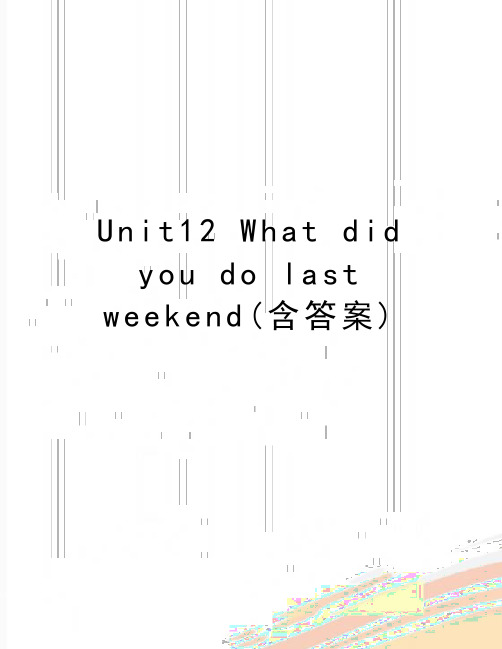
U n i t12W h a t d i d y o u d o l a s tw e e k e n d(含答案)英语人教七年级下Unit12 What did you do last weekend单元测评(分数:100分时间:90分钟)第Ⅰ卷听力部分(20分)第Ⅱ卷笔试部分(80分)Ⅳ.单项选择(10分)16.______ did you do last weekend?A.How B.Where C.What D.When17.Did you have great fun ______ English from Mr.Green?A.learn B.learning C.learns D.learned18.The boy ______ when he was in the mountain by himself.A.lost B.loses C.is lost D.was lost19.—You look very tired.—I ______ too late to watch the basketball game last night.A.stayed up B.put up C.woke up D.called up20.The soup is very ______; I'd like some more.A.delicious B.awful C.well D.ch eap21.—Who cleaned the classroom?—Bob ______.A.does B.did C.cleaned D.was22.—______ was your weekend?—It ______ really relaxing.A.How;was B.What;were C.What;was D.How;were23.We all know that snakes have no ______.A.eyes B.mouths C.teeth D.ears24.I saw a cat ______ with a ball in the living room.A.play B.played C.plays D.playing25.The weather was terrible,and it ______ me ______ sad.A.make;feel B.made;feel C.made;felt D.makes;feelⅤ.完形填空(10分)Last Sunday we had a great trip.My father, my mother and I __26__ to summer camp.We went to a mountain.First we __27__ to the foot of the mountain __28__ bus.In the middle of the mountain there was a river.The water was clean and clear.I washed my face __29__ the water.It was warm.There __30__ some fish in the river.In the mountain there were flowers.They were __31__.At noon, many people got together, and they were very __32__.We made our meal in the mountain.The food was v ery __33__, and we liked it very much.After meal, we went on our trip.We felt __34__.It was really __35__.26.A.go B.goes C.went D.going27.A.get B.got C.got to D.arrived28.A.by B.on C.in D.took29.A.on B.with C.for D.into30.A.is B.was C.were D.are31.A.ugly B.beautiful C.awful D.delicious32.A.friendly B.friends C.busy D.tired33.A.nice B.terrible C.bad D.worse34.A.happy B.unhappy C.friendly D.unpleasant35.A.cold B.hot C.fun D.sadⅥ.阅读理解(30分)AMost American families like to have vacation in summer.Summer is a good season forv acation.It is often hot in July and August.Children do not go to school in those two months.Some like to stay at home, read books, stay with their families or watch TV.Many families take their lunch to eat at a place with many trees or near a nice lake.Some people have enough time and money to travel(旅行)to other countries like France, Japan and Australia.They usually fly to these countries.Many families travel by car or train to see interesting places in their own countries.Their favorite cities are New York, Chicago, Miami, San Francisco and Los Angeles.Not everyone likes to go to busy cities.Some families travel to mountains or beautiful valleys (山谷).36.According to the passage,______ is a good season for vacation.A.spring B.summer C.autumn D.winter37.Some children like to stay at home during their vacation.They don't ______.A.read books B.stay with their familiesC.watch TV D.go to school38.Many families like to have their lunch ______ during their vacation.A.in the office B.near a cinemaC.near a big factory D.near a nice lake39.If you have ______, you can travel to other countries.A.money and friends B.friends and timeC.money and time D.food40.Which of the following is “芝加哥” ?A.Chicago. B.New York. C.Miami. D.Los Angeles.BDear Jane,After I left Paris I spent two days in New York City and one day in Washington D.C.I got to Miami, Florida on Nov.13.The weather is wonderful here.Thismorning I went swimming and then slept on the beach.When I woke up, I foundJennifer Lopez—my favorite movie star.She was just on my right!I asked her totake a picture with me.You know, that was my dream.She agreed!I'm going toshow you!John Dear Dad,I got here at last after 18 hours on a train!It's very cold here in Moscow.It'swhite everywhere.This afternoon I went to have a look at the city.I got lost.I amglad I took Russian lessons in my university.They helped me a lot.A young girlshowed me the way back to my hotel.I think I can finish my work here and go backhome soon.I'm looking forward to the warm sunshine at home.See you soon.Max Dear Amy,I arrived in Guilin yesterday.What a beautiful place!The people here are kindand I have some new friends.Guess who I met here!Tom, my high schoolclassmate.How small the world is!He is working here as an English teacher at amiddle school.He showed me around the city.I also went to his school.His studentslike him very much.I bought a special bag made in Guilin for you and a silk tablecloth for mom.Tomorrow evening I'm going to fly to Beijing.Love,Maria 41.Each of the three had a good time.42.Maria went to see her classmate in Guilin.43.It was warmer in Max's hometown(家乡)than in Moscow.44.John was very glad that his dream of going to the beach came true.45.Max speaks a little Russian.CBob's weekendAre you often free on weekends? Bob had a busy weekend last week.(1)On Saturday morning,he went to visit his grandmother with his parents. His grandmother lives in a beautiful village.There Bob went to the mountains with his cousin.After dinner,he went shopping at Haorizi Supermarket.In the evening,he saw an interesting comedy.On Sunday morning,Bob wanted to play soccer,but(2)_it_was_rained_very_hard,so he had to stay at home.He wanted to play the guitar,but he couldn't find his guitar.So he did some reading and watched TV.In the afternoon,(3)他帮助妈妈做家务,然后和爸爸下象棋。
人教版七年级下册英语 Unit 12 What did you do last weekendse

1e Make a conversation. Ask what your partner did last weekend.
A: Did you do anything interesting last weekend?
(×) for afraid animals.
___dog ___spider
___tiger ___lion ___cat ___chicken
___snake ___pig
2b Read about Lisa's weekend and answer the questions.
1. How was Lisa's weekend? ______________________________ 2. Where did Lisa and her family go last weekend? ___________________________________________ 3. How did Lisa feel when she saw the snake? _______________________________________ 4. What did Lisa and her sister do? __________________________________ 5. What did their parents do? Why did they do that? __________________________________________ 6. What lesson did Lisa learn from the weekend? ____________________________________________
七年级英语下册 Unit 12 What did you do last weekend Secti
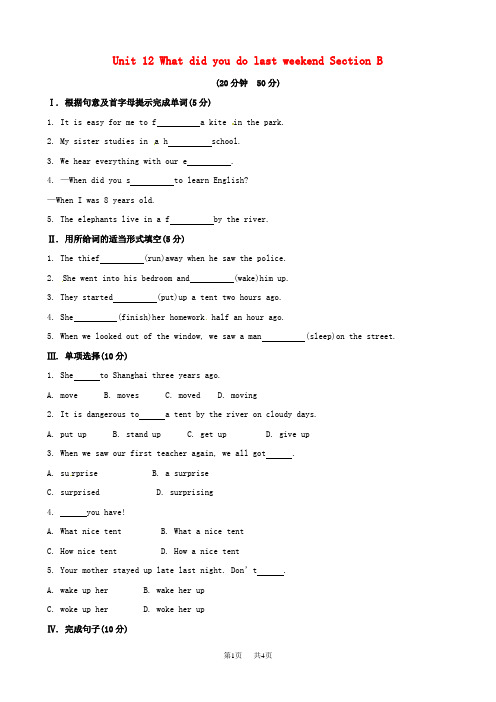
Unit 12 What did you do last weekend Section B(20分钟50分)Ⅰ. 根据句意及首字母提示完成单词(5分)1. It is easy for me to f a kite in the park.2. My sister studies in a h school.3. We hear everything with our e .4. —When did you s to learn English?—When I was 8 years old.5. The elephants live in a f by the river.Ⅱ. 用所给词的适当形式填空(5分)1. The thief (run)away when he saw the police.2. She went into his bedroom and (wake)him up.3. They started (put)up a tent two hours ago.4. She (finish)her homework half an hour ago.5. When we looked out of the window, we saw a man (sleep)on the street. Ⅲ. 单项选择(10分)1. She to Shanghai three years ago.A. moveB. movesC. movedD. moving2. It is dangerous to a tent by the river on cloudy days.A. put upB. stand upC. get upD. give up3. When we saw our first teacher again, we all got .A. su rpriseB. a surpriseC. surprisedD. surprising4. you have!A. What nice tentB. What a nice tentC. How nice tentD. How a nice tent5. Your mother stayed up late last night. Don’t.A. wake up herB. wake her upC. woke up herD. woke her upⅣ. 完成句子(10分)1. 我学会了如何炒鸡蛋。
Unit 12 What did you do last weekend(讲义及答案)
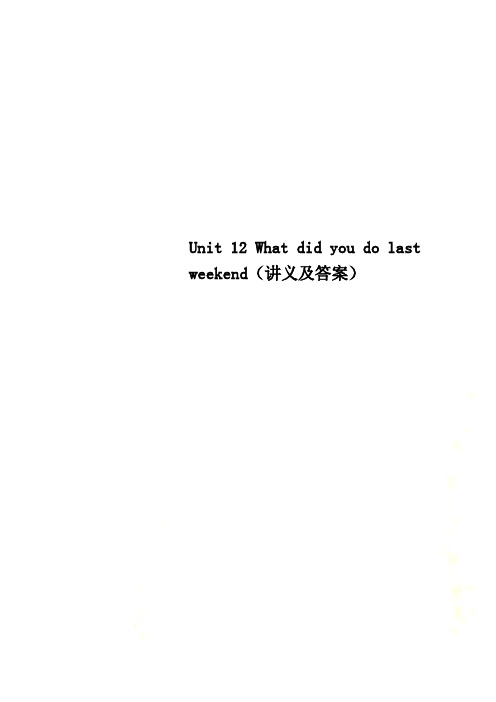
Unit 12 What did you do last weekend(讲义及答案)Unit 12 What did you do last weekend?(讲义)Part 1 Words and Expressionscamp /kæmp/ v. 扎营;搭帐篷lake /leɪk/ n. 湖;湖泊beach /biːtʃ/ n. 海滩;沙滩badminton /'bædmɪntən/n. 羽毛球运动sheep /ʃiːp/ n. 羊;绵羊as /æz/ prep. & adv. 作为;当作natural /'nætʃərəl/adj. 自然的butterfly /'bʌtə(r)flaɪ/ n. 蝴蝶visitor /'vɪzɪtə(r)/n. 游客;访问者tired /taɪə(r)d/adj. 疲倦的;疲劳的stay /steɪ/ v. 停留;待stay up late 深夜不睡;熬夜away /ə'weɪ/ adv. 离开;远离run away 跑开mouse /maʊs/ n. (pl. mice /maɪs/) 老鼠;耗子baby /'beɪbi/ adj. 幼小的n. 婴儿shout /ʃaʊt/ v. 呼叫;喊叫shout at …冲……大声叫嚷woof /wʊf/ interj. (狗叫声)汪汪language /'læŋgwɪdʒ/ n. 语言fly /flaɪ/ v. (flew /fluː/)飞kite /kaɪt/ n. 风筝fly a kite 放风筝high /haɪ/ adj. & adv. 高的(地)high school 中学ago /ə'gəʊ/ adv. 以前India /'ɪndiə/n. 印度tent /tent/ n. 帐篷put up 搭起;举起moon /muːn/ n. 月亮surprise /sə(r)'praɪz/ n. 惊奇;惊讶v. 使吃惊get a surprise 吃惊snake /sneɪk/ n. 蛇开始做某事surprise n. 惊奇;惊讶v. 使吃惊You didn’t know my surprise when I he ard that news.My sister and I got a terrible surprise yesterday.get a surprise 吃惊Jimmy’s words surprised me a lot.It surprised us to see Jane get up soearly. surprise sb. 使……吃惊n. 意想不到的事;惊喜It’s a lovely surprise to see youagain. I have a little surprise foryou.shout v. 呼叫;喊叫There’s no need to shout. I am notdeaf! We could hear them shoutingfor help. shout at…s hout to…The bus driver is shouting at the oldman. Don’t shout at me. I don’t likethat.I had to shout to Tom because he was so far from me.My mother shouted to me on the other side of the road, but I still couldn’t hear her w ords.shout at…对……叫嚷,多指因shout to…对……喊,多指因Part 2 Role-playRole-play the conversation.Paul: Hi, Lisa. How was yourweekend? Lisa: Great, thanks.Paul: What did you do?Lisa: I worked as a guide at the Natural HistoryMuseum. Paul: Really? How interesting!Lisa: Yeah, it was fun. They have butterfly house with over 200 kinds of butterflies! I told the visitors about themand their living habits. Did you have a good weekend? Paul: Yeah, it was good, but I’m kind of tired now. I stayed up late to watch the soccer game.How interesting!Look at the bird. How beautiful!I had a terrible weekend. How tired!Five hours ago we left Beijing on this train, but now we’re arriving in Shanghai! How fast!I got on the bus one hour ago. How slowly!how 引导感叹句,译为“多么……;真……”,后面接或。
Unit12Whatdidyoudolastweekend知识点总结知识讲解
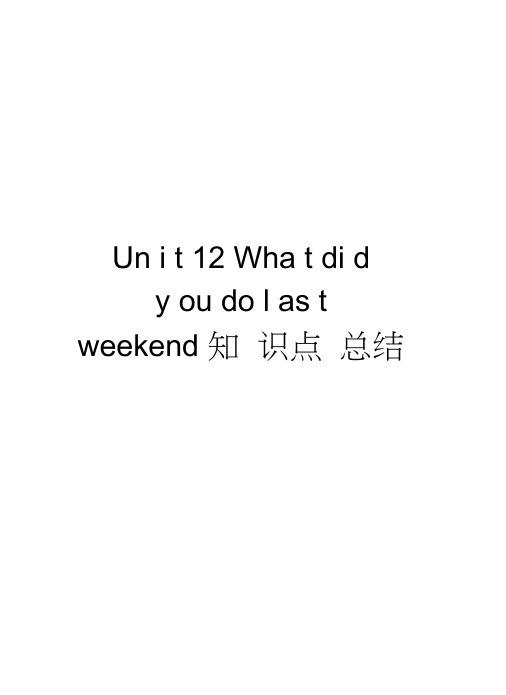
Un i t 12 Wha t di dy ou do l as t weekend 知识点总结Unit 12 What did you do last weeke nd?一.重点短语及句子fly a kiteflew a kitehave dinner with frie ndshad dinner with friends run awayran awaydo one ' homework did one ' homework get a surprise got a surprise wake up woke up put upput up(二)重点句子What did you do last weeke nd? I played soccer. Who did you play with? I played with my frie nds. Where did she go last weekend? She went to a farm. Who visited her gran dma? Becky did.1. lake, by the lake 在湖边They are play ing football by the lake.2. beach, on the beach 在海滩上;beach volleyball 沙滩排球3. sheep 单复同型。
同样的单复同型的单词还有: Chi nese , Jap a nese, deer4. tired ,tiringtired 形容词,“疲倦的,疲劳的” I am tired. tiring 形容词,“累人的”Climb ing is tiri ng, and we were kind of tired on the top of the mountains. 5. stay up 熬夜” stay healthy 保持健康=keep healthy stay up : She likes to stay up to watch soccer games. stay healthy: It is important for us to stay healthy. 6. away 副词“离开,远离” far away 彳艮远:She lives far away.be/stay away form 远离 .. The boy stayed away from school today.原形过去式camp by the lake camped by the lake play badm inton played badm inton work as worked as stay up stayed up shout to shouted to shout atshouted atstudy for the En glish teststudied for the En glish testgo to the cin ema went to the cin ema go boati ng went boat ing go to the beach went to the beach go to a farm went to a farm go to the librarywent to the library(一)重点短语 .知识点精讲put away 把... 收好You must put away your thi ngs.run away 逃跑,跑掉Before the policemen came, the thief ran away.take away 拿走Tom takes the knife away from the little boy.7. mouse复数形式为mice8. shout to & shout atshout to:多只对某人发生叫喊,不带感情因素:She shouts to me loudly.shout at:多指因为生气等而非善意地对某人吼叫:It is impolite to shout at the old people.9. work asas为介词,意为“作为,以……身份”后接名词作宾语as的其他用法:(1).......................... as•…as “和一样”表示同级的比较,使用时要注意第一个as为副词,第二个as为连词。
Unit 12 What did you do last weekend-知识点整理

Unit 12 What did you do last weekend?知识点整理Unit 12 What did you do last weekend?知识点整理一、重点短语1. play badminton 打羽毛球2. camp by the lake 在湖边野3. gbeach 去海滩4. ga 去电影院5. tell sb. about sth.告诉某人有关...的情况6. stay up 熬夜7. ovan超过;多余 8. fly a kite 放风筝9. run away 逃跑 10. second language 外语11. anythingg注:不定代词+形容词 12. shout to sb. 对某人大声喊叫13. that’s why+从句“那就是为什么......” 14. ta 带领某人去某处15. put u搭建帐篷 16. make a fire 生火us warm 使得我们暖和ght 在头一天夜里19. und在月光下 20. ea互相21. get a terrible surprise 大吃一惊 22. look out of 从......往外看23. know about 知道 24. start to do sth. 开始做某事25. up and down 上上下下 26. wake up 醒来 wake sb. up 叫醒某人27. mov移动进入 28. learned from 从......学到29. stay at home 呆在家里二.重点句型1. —What did you do last week? 你上个星期做了什么事?—I didwork. /We went boating 我做我的作业。
/我们去划船了。
2. —How was your weekend? 你上个星期过得怎样?—Great,thanks. 很好,谢谢。
3. I stayed up late to wagame. 我熬夜到很晚是为了看球赛。
七年级英语下册 Unit 12 What did you do last weekend(Sec

Unit 12 What did you do last weekend(Section A 1a-2d)学习目标:1.能正确表达周末活动。
2..能用所学语言谈论过去发生的事情。
3.能正确使用一般过去时态的特殊疑问句询问信息。
重难点:1.能用所学语言谈论过去发生的事情。
2.能正确使用一般过去时态。
当堂测评分层达标基础落实★(一)用所给词的适当形式补充完整1.What's ____________ name?(you)2.Nice ____________ you.(meet)3.____________ name is Gina.(I)4.____________ this? It's a book.(what)(二)用am , is, are填空:1. -----Hi, I _______ Frank . What _______ your name? ----My name _______ Lisa.2. -----Hello! How ________ you? -----I ______ fine, thank you.3. -----What _______ this in English? ------ It _______a telephone.4. Her first name _____ Gina.5. ________ you Ben? No. I _______ Alan.(三)句型转换:1. My name is Amy.(就划线部分提问)______ ________ ________ name, please?2. Her name is Gina .(就划线部分提问)_______ ______ her name?3. He is Bob.(同义句转换)_______ ________ __________ ________4. I am fine .______ are you?6. That boy's name is Jeff . (对划线部分提问)_________ that boy’s __________?(四)从B栏中找出A栏的答语。
Unit12Whatdidyoudolastweekend知识点总结

Unit 12 What did you do last weekend? 1.重点短语及句子(一) 重点短语(二)重点句子What did you do last weekend? I played soccer.Who did you play with? I played with my friends.Where did she go last weekend? She went to a farm.Who visited her grandma? Becky did.2.知识点精讲1. lake, by the lake在湖边They are playing football by the lake.2. beach, on the beach 在海滩上;beach volleyball沙滩排球3. sheep 单复同型。
同样的单复同型的单词还有:Chinese,Japanese,deer4. tired,tiringtired 形容词,“疲倦的,疲劳的”I am tired.tiring形容词,“累人的”.Climbing is tiring, and we were kind of tired on the top of the mountains.5. stay up “熬夜”stay healthy 保持健康=keep healthystay up:She likes to stay up to watch soccer games.stay healthy: It is important for us to stay healthy.6. away 副词“离开,远离”far away 很远: She lives far away.be/stay away form 远离…… The boy stayed away from school today.put away 把……收好 You must put away your things.run away 逃跑,跑掉 Before the policemen came, the thief ran away.take away 拿走 Tom takes the knife away from the little boy.7. mouse 复数形式为mice8. shout to & shout atshout to: 多只对某人发生叫喊,不带感情因素:She shouts to me loudly.shout at:多指因为生气等而非善意地对某人吼叫:It is impolite toshout at the old people.9. work asas 为介词,意为“作为,以……身份”后接名词作宾语as的其他用法:(1)as……as “和……一样”表示同级的比较,使用时要注意第一个as为副词,第二个as为连词。
(完整word版)Unit12Whatdidyoudolastweekend知识点、一般过去时解析,单元测试及答案,推荐文档

Unit12 What did you do last weekend?I词性转换1.beach 复数:beaches2.sheep 复数:sheep3.nature 形容词:natural4.butterfly 复数:butterflies5.visit 名词:visitor6.mouse 复数:mice7.baby 复数:babies 8.fly过去式:flew9.sing 过去式:sang 10.swim 过去式:swam11.surprise 形容词:surprised,surprising 12.wake过去式:woke13.put 过去式:put 14.tell 过去式:told 15.leave 过去式:leftII短语归纳1.do my homework 做作业2.go to the cinema 去看电影3.go boating 去划船4.by the lake 在湖边5.go to the beach 去海滩6.play badminton 打羽毛球7.visit my grandma 看望我奶奶8.study for the English test 为英语测验而学习备考9.the Natural History Museum 自然历史博物馆10.kind of 有点儿11.stay up 深夜不睡,熬夜12.give back 归还13.be afraid 害怕14.play the guitar 弹吉他15.go to the library 去图书馆16.in a swimming pool 在游泳池里17. shou t at… 冲……大声叫嚷18.high school 高中,中学19.fly kites 放风筝、20.go camping 去野营21.put up 搭建22.make a fire 生火23.tell stories 讲故事24.each other 互相25.go to sleep 入睡26.get a surprise 吃惊27.shout to… 呼喊……喊叫……28.up and down 来来回回;上上下下29.wake…up 把……弄醒31.on Saturday morning 在星期六早上32.have a good weekend 周末过得愉快33.the next morning 第二天早上34.work as 以……身份而工作35.run away 跑开36.move into … 移进…1. 表示“发生在过去的动作”,要用一般过去时,句中常含表示“过去”的时间。
七年级英语下册 Unit 12 What did you do last weekend Secti

go boating
go camping
camp by the lake
go camping by the lake
go to the beach go to the cinema play badminton
1. do---did my homework 2. go---went to the cinema 3. go---went boating 4.go--- went to the beach 5.camp---camped by the lake 6. played badminton
Listen! What did they say?
Bob
Lucy
Sunday night
Saturday night
Saturday afternoon
Sunday afternoon Saturday morning
Sunday morning
Listen again, and fill in the blanks.
What did they do? They went fishing.
What did he do last weekend? He did his homework.
What did they do last weekend? They visited a history museum.
Match the activities with the
On Saturday moning, Lucy played_b_a_d_m_i_to_n_, in the afternoon, she _w_e_n_t_to the beach, and went to thec_in_e_m__a_. On Sunday morning, she c_a_m_p_e_d_ by the lake with her friends. On Sunday afternoon, she _w_e_n_t____ boating.And at night, She __d_i_d____ her homework.
七年级英语下册 Unit 12 What did you do last weekend Secti

1. Look at the pictures and complete the passage.
Point out the pictures and ask students to describe what they see. Then finish3a.
2.Reading: A Weekend to Remember
3.Writing:Write about what you did last weekend.
Step 5 Homework
1.Remember the new words and phrase after class.
1.(Show some ures of the new words in the passage on the big screen)
Present some new words and expressions to the Ss.
2. Ss learn the new words and expressions by themselves and try to remember them.
Make a list. Ask students to say the words by themselves.
通过图片向学生呈现新单词,并通过师生对话的方式教授新单词
Step 3 Practice
I. Activities 2b and 2c
1.Fast reading:Read about Lisa’s weekend. What did they do? Tick (√) the right pictures.
2. Careful reading
七年级英语下册 Unit 12 What did you do last weekend Secti
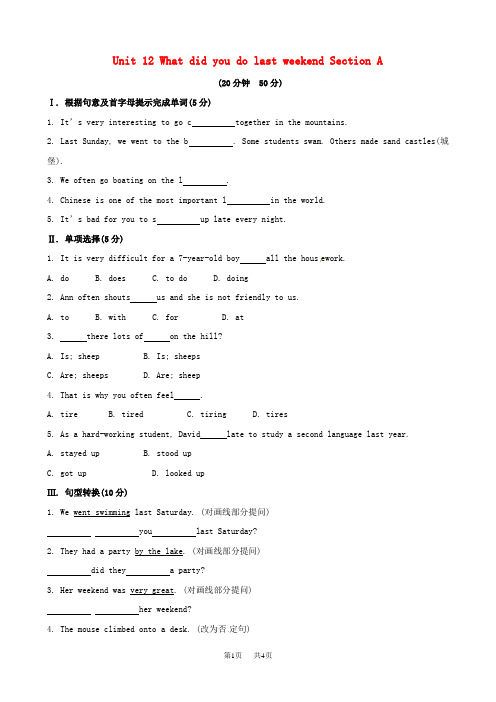
Unit 12 What did you do last weekend Section A(20分钟50分)Ⅰ. 根据句意及首字母提示完成单词(5分)1. It’s very interesting to go c together in the mountains.2. Last Sunday, we went to the b . Some students swam. Others made sand castles(城堡).3. We often go boating on the l .4. Chinese is one of the most important l in the world.5. It’s bad for you to s up late every night.Ⅱ. 单项选择(5分)1. It is very difficult for a 7-year-old boy all the hous ework.A. doB. doesC. to doD. doing2. Ann often shouts us and she is not friendly to us.A. toB. withC. forD. at3. there lots of on the hill?A. Is; sheepB. Is; sheepsC. Are; sheepsD. Are; sheep4. That is why you often feel .A. tireB. tiredC. tiringD. tires5. As a hard-working student, David late to study a second language last year.A. stayed upB. stood upC. got upD. looked upⅢ. 句型转换(10分)1. We went swimming last Saturday. (对画线部分提问)you last Saturday?2. They had a party by the lake. (对画线部分提问)did they a party?3. Her weekend was very great. (对画线部分提问)her weekend?4. The mouse climbed onto a desk. (改为否定句)The mouse onto a desk.5. The boy ran away when the teacher saw him. (改为一般疑问句)the boy away when the teacher saw him?Ⅳ. 补全对话(10分)从方框中选择最佳选项完成对话。
- 1、下载文档前请自行甄别文档内容的完整性,平台不提供额外的编辑、内容补充、找答案等附加服务。
- 2、"仅部分预览"的文档,不可在线预览部分如存在完整性等问题,可反馈申请退款(可完整预览的文档不适用该条件!)。
- 3、如文档侵犯您的权益,请联系客服反馈,我们会尽快为您处理(人工客服工作时间:9:00-18:30)。
Present new words and phrases
1.go camping 去露营,去野营 2.put up 搭起,举起,张贴,建造 3.jump up and down 上下跳跃 4.make a fire 生火 5.cook food 做饭 6.so…that… 如此…以至于… 7.wake up 把…弄醒 8.shout at sb. 对某人大声喊 (只强调声音不带感情色彩) 9.get a terrible surprise 大吃一惊
2b Read about Lisa’s weekend and answer the questions.
1. How was Lisa’s weekend? 2. Where did Lisa and her family go last weekend? 3. How did Lisa feel when she saw the snake? 4. What did Lisa and her sister do? 5. What did their parents do? Why did they do that? 6. What lesson did Lisa learn from the weekend?
6. What lesson did Lisa learn from the weekend? Don’t go near snakes./ Snakes can’t hear but they can feel movements.
2c Put the phrases in order according to the passage. Then use them to retell the story.
crocodile ['krɒkədail] 鳄鱼
tiger 老虎
lion 狮子
snake 蛇
What kinds of animals are 2a people sometimes afraid of? Why? Make a list. I think people are afraid of tigers, lions and snakes because they’re scary or dangerous.
On the early morning of November 20th, we got a special postcard
7. But I was so tired that I went to sleep early. 但是我太累了,所以早早就睡着了。 我是那么害怕,一动都不敢动。
I was so scared __ 6 snake went into the forest ____ 2 put up our tests and cooked food ____ 8 learned a useful lesson 4 saw a snake and shouted to parents ____ for help ____ 7 snakes can’t hear but can feel things moving ____ 5 my dad jumped up and down in his tent ____ 1 took a bus to a small village in India 3 told stories under the moon, then ____ went to sleep
其后可以跟一个时间的点;表示“在某
个时间点之前”,但不一定用于一般过
去时态。例如:
我常在七点钟前去上学。
I usually go to school before seven.
此外,before也可以单独用,意为“以 前”,可用于一般过去时态中。例如: 以前我不知道那件事情。 I didn’t know that before.
6. On the first night, … 在头一天夜里,„„ 英语中表示一天中的时间分别采用at night (在夜里)、in the morning (在上午)、in the evening (在下午)等,但表示“在某一天上午、 下午或晚上等”的特定时间,往往使用介词 on。例如: 在11月20号一大清早,我们收到了一张特殊 的明信片。
2) 本句中动词take 表示“带领”,take …
to …则表示“带领某人去某处”。例如:
On Sundays, the father would take his son to the park. 一到星期天,爸爸便会带他的儿子去公园。
辨析: bring, take, carry, fetch
5. There we put up tents and made a fire to keep us warm and cook food on. 在那里我们架起帐篷,生火取暖并做饭。 1) 动宾短语表达法:put up tents 搭建帐篷; make a fire 生火;keep us warm 使得我们暖 和;cook food on the fire 在火上做饭 2) 本句的主体部分是we put up tents and made a fire, 后续的 to keep us warm and cook food on (it) 表达的是made a fire 的目的。句尾介 词“on” 后有所省略,以避免重复。
1. two weeks ago 两星期前,一段时间 + ago意为“多长时间之前”,是表达过 去的时间。它常与一般过去时态连用。 三天前,我们参观了自然历史博物馆。 We visited the Natural History Museum three days ago. 【辨析】before 意为“在……之前”,
terrible surprise. When they
looked out of the tent, they saw
a big snake sleeping near the
fire. She was so scared that she
couldn’t move. They shouted to
英语中 “so +形容词+that 句子”,表示 “太„„以至于„„”。例如: 这个游戏是如此有意思,以至于我都不想停下 来。The game is so interesting that I don’t want to
bring 意为“拿来,带来”,表示“拿到 靠说话人近的地方”。 take 意为“拿走,带走”,表示“拿到远 离说话人远的地方”。 carry 意为“扛,搬”,用力移动,没有 方向性。 fetch 意为“去取,去拿”表示往返拿物。
The Young Pioneer ______ water for the old man every day. A. fetches B. brings C. takes D. carries
Lisa’s last weekend was interesting but scary.
They went camping in a small village in India. First, they took a long bus ride to a lake in the countryside. There they put up their tents and made a fire to keep them warm and cook food.
1. How was Lisa’s weekend?
It was interesting but scary.
2. Where did Lisa and her family go last
weekend? They went to a small village in India. 3. How did Lisa feel when she saw the snake? She was so scared that she couldn’t move.
their parents to let them know
about the danger.
Her dad started to jump up and down in their tent. This woke the snake up and it moved into the forest near the lake.
答案:选D。 bring从远处把某物拿到跟前;take… (with)随身带上某物,即物就在旁边;通 过用力搬运、扛、抬等,那是carry的能力范 围;fetch去把某物拿来,强调的是“去、回” 双线行为。
4. put up 意为“搭起;举起” 让我们将帐篷搭起来吧。 Let’s put up the tent. 如果你有什么问题,请举起手来。 If you have any questions, please put up your hands.
Her dad told her later that snakes don’t have ears but they can feel things moving. He also told her it was important not to go near a snake. This was a very useful lesson for her.
